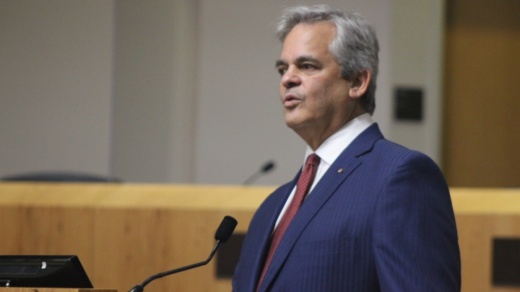Adler kicked off his speech by directing his thanks to Austinites ranging from city staff and council members to health care and essential workers for their work over the past year.
Adler shared his views on Austin's strengths amid recent hardship.
“By just about every traditional and frequently-used measure, Austin is the envy of cities across the country. Austin has just added jobs in 13 of the last 15 months. In fact, Austin has regained most of the pandemic-related jobs that were lost during the spring of last year. Austin’s unemployment rate of 4.2%, anticipated at a seasonally-adjusted rate of 4.0%, is the very lowest among the 25 largest cities in the country. Austin ranks as the second-best performing major job market since the beginning of the pandemic. Austin is the safest of the four biggest cities in Texas and is among the five safest big cities in the entire country," Adler said.
Adler also took time to note disparities persisting in the city. With more work yet to be done, he said Austin has made progress since last year in part by expanding affordable housing options, providing rental assistance through the pandemic and moving ahead on Reimagining Public Safety initiatives. In addition to confronting inequality, Adler said Austin is now contending with several issues he sees as stemming from growing polarization and a potential loss of community.
“This phenomenon is not unique to Austin. It’s happening nationally, but it feels more strange and foreign to an Austinite because of our strong local history and what has been the powerful interconnectivity of those that choose to call Austin home," Adler said.
Three challenges Adler chose to examine further were local attitudes related to COVID-19 and its delta variant, policing, and Austin's handling of homelessness.
On pandemic response, Adler repeated his months-long call for Austinites to follow public safety measures in an effort to reduce viral spread and hospitalizations. He also called opposition to those measures the "clearest illustration" of the harms of disinformation, and said he would use his authority to push back on related prohibitive state-level policies, and encourage testing and vaccination of city employees when possible.
“What makes our current situation so frustrating is that we are our own worst enemy," Adler said. "The only way to stop this virus is with vaccines, and in the interim, with masking."
When discussing public safety in Austin, Adler also rebuked claims that the city is growing less safe, and that he and other City Council members do not support the Austin Police Department force. One year after focusing his annual message on the push to "reimagine" public safety in Austin and reinvest portions of APD's budget, Adler said he backed APD and said he wants more officers on the streets. He also circled back to the remaining need for additional reforms at the department and a push to reduce the increasing homicides Austin has seen since 2020.
“We can support our police officers while also being critical of harm done to peaceful demonstrators. ... We can admire the heroism of police officers while also disapproving of inappropriate police interactions on video. It is not right that so many in our community, especially many of those of color, do not feel as safe with our police," Adler said.
Finally, Adler called attention to perceived controversy surrounding city initiatives aimed at combating homelessness, including the implementation of the Proposition B camping ban.
The local "Summit Plan" to rehouse 3,000 people through 2024 established through this spring's Summit to Address Unsheltered Homelessness is one Adler has continually referenced since its housing target was set earlier this year. During his speech he again raised his desire to see the community join resources to meet that goal, while pointing to the city's Homeless Encampment Assistance Link and several hotel purchases over the past year as aspects of the plan that are already working. He also dismissed accusations that the city is not pursuing full enforcement of Proposition B's camping ban in a timely manner and highlighted encampment clearing and hotel conversions as strategies he believes the city should stick to.
“We need to meet this challenge, remove the tents, house and support the people, and accomplish this in a way that invests our dollars in long-term solutions. And while this takes time, we are already seeing successes ... and in this action and result we are finding another path toward community cohesion," Adler said.





